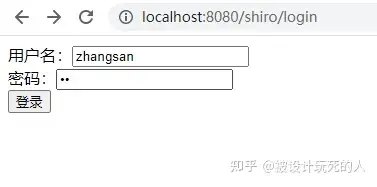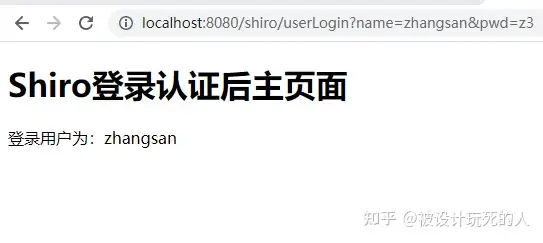springboot整合shiro认证授权
前言
shiro是一个权限框架,主要包括认证和授权两大部分。
认证指的就是登录,授权指的就是指定权限。
同类框架有springsecurity。
他们的区别在于springsecurity功能较多,但依赖于spring,shiro不强依赖spring。
一、准备
1、版本
springboot2.2.1.RELEASE
其他maven依赖
<dependency>
<groupId>org.apache.shiro</groupId>
<artifactId>shiro-spring-boot-web-starter</artifactId>
<version>1.9.0</version>
</dependency>
<dependency>
<groupId>org.springframework.boot</groupId>
<artifactId>spring-boot-starter-web</artifactId>
</dependency>
<dependency>
<groupId>org.projectlombok</groupId>
<artifactId>lombok</artifactId>
</dependency>
<dependency>
<groupId>com.baomidou</groupId>
<artifactId>mybatis-plus-boot-starter</artifactId>
<version>3.0.5</version>
</dependency>
<dependency>
<groupId>mysql</groupId>
<artifactId>mysql-connector-java</artifactId>
<version>5.1.46</version>
</dependency>
<dependency>
<groupId>org.springframework.boot</groupId>
<artifactId>spring-boot-starter-thymeleaf</artifactId>
</dependency>2、配置文件
mybatis-plus:
configuration:
log-impl: org.apache.ibatis.logging.stdout.StdOutImpl
mapper-locations: classpath:mapper/*.xml
spring:
datasource:
type: com.zaxxer.hikari.HikariDataSource
driver-class-name: com.mysql.jdbc.Driver
url: jdbc:mysql://localhost:3306/shiro?characterEncoding=utf-8&useSSL=false
username: root
password: root
jackson:
date-format: yyyy-MM-dd HH:mm:ss
time-zone: GMT+8
shiro:
loginUrl: /shiro/login3、代码
启动类mapper包扫描
@MapperScan("com.example.shirodemo.mapper")
@SpringBootApplication
public class ShiroDemoApplication {
public static void main(String[] args) {
SpringApplication.run(ShiroDemoApplication.class, args);
}
}实体类
@AllArgsConstructor
@NoArgsConstructor
@ToString
@Data
public class User {
private Integer id;
private String name;
private String pwd;
private Integer rid;
}mapper层
public interface UserMapper extends BaseMapper<User> {
}
service接口
public interface UserService {
/**
* 用户登录
*
* @param name
* @return
*/
User getUserInfoByName(String name);
}
service实现
@Service
public class UserServiceImpl implements UserService {
@Autowired private UserMapper userMapper;
@Override
public User getUserInfoByName(String name) {
QueryWrapper<User> wrapper = new QueryWrapper<>();
wrapper.lambda().eq(User::getName, name);
User user = userMapper.selectOne(wrapper);
return user;
}
}4、数据库表
user表
CREATE TABLE `user` (
`id` int(11) NOT NULL AUTO_INCREMENT,
`name` varchar(255) DEFAULT NULL,
`pwd` varchar(255) DEFAULT NULL,
`rid` int(11) DEFAULT NULL,
PRIMARY KEY (`id`)
) ENGINE=InnoDB DEFAULT CHARSET=utf8mb4;
# 插入数据
INSERT INTO `shiro`.`user` (`id`, `name`, `pwd`) VALUES (1, 'zhangsan', '7174f64b13022acd3c56e2781e098a5f')二、登录认证实现
1、自定义认证授权
@Component
public class MyRealm extends AuthorizingRealm {
@Autowired private UserService userService;
/**
* 自定义登录认证
*
* @param authenticationToken
* @return
* @throws AuthenticationException
*/
@Override
protected AuthenticationInfo doGetAuthenticationInfo(AuthenticationToken authenticationToken)
throws AuthenticationException {
// step.1 获取用户身份信息
String name = authenticationToken.getPrincipal().toString();
// step.2 调用业务逻辑层获取用户信息(数据库)
User user = userService.getUserInfoByName(name);
// step.3 非空判断,将数据封装返回
if (user != null) {
SimpleAuthenticationInfo info =
new SimpleAuthenticationInfo(
authenticationToken.getPrincipal(),
user.getPwd(),
ByteSource.Util.bytes("salt"),
authenticationToken.getPrincipal().toString());
return info;
}
return null;
}
}2、配置类
@Configuration
public class ShiroConfig {
@Autowired private MyRealm myRealm;
/**
* 配置SecurityManager
*
* @return
*/
@Bean
public DefaultWebSecurityManager defaultWebSecurityManager() {
// step.1 创建defaultWebSecurityManager 对象
DefaultWebSecurityManager defaultWebSecurityManager = new DefaultWebSecurityManager();
// step.2 创建加密对象,设置相关属性
HashedCredentialsMatcher matcher = new HashedCredentialsMatcher();
// step.2.1 采用md5加密
matcher.setHashAlgorithmName("md5");
// step.2.2 迭代加密次数
matcher.setHashIterations(3);
// step.3 将加密对象存储到myRealm中
myRealm.setCredentialsMatcher(matcher);
// step.4 将myRealm存入defaultWebSecurityManager 对象
defaultWebSecurityManager.setRealm(myRealm);
// step.5 返回
return defaultWebSecurityManager;
}
/**
* 配置shiro内置过滤器拦截范围
*
* @return
*/
@Bean
public DefaultShiroFilterChainDefinition defaultShiroFilterChainDefinition() {
DefaultShiroFilterChainDefinition definition = new DefaultShiroFilterChainDefinition();
// 设置不认证可以访问的请求地址
definition.addPathDefinition("/shiro/userLogin", "anon");
definition.addPathDefinition("/login", "anon");
// 设置需要进行登录认证的拦截范围
definition.addPathDefinition("/**", "authc");
return definition;
}
}3、接口类
@Controller
@RequestMapping("/shiro")
public class UserController {
/**
* 跳转登录页面
*
* @return
*/
@GetMapping("/login")
public String login() {
return "login";
}
/**
* 登录
*
* @param name
* @param pwd
* @return
*/
@GetMapping("/userLogin")
public String userLogin(String name, String pwd, HttpSession session) {
// step.1 获取subject对象
Subject subject = SecurityUtils.getSubject();
// step.2 封装请求数据到token
UsernamePasswordToken token = new UsernamePasswordToken(name, pwd);
// step.3 调用login方法进行登录认证
try {
subject.login(token);
// return "登录成功";
session.setAttribute("user", token.getPrincipal().toString());
return "main";
} catch (AuthenticationException e) {
e.printStackTrace();
System.out.println("登录失败");
return "登录失败";
}
}
}
4、前端页面
login页面
<!DOCTYPE html>
<html lang="en">
<head>
<meta charset="UTF-8">
<title>登录页面</title>
</head>
<body>
<form action="/shiro/userLogin">
<div>用户名:<input type="text" name="name"/></div>
<div>密码:<input type="password" name="pwd"/></div>
<div><input type="submit" value="登录"/></div>
</form>
</body>
</html>登录成功页面
<!DOCTYPE html>
<html lang="en" xmlns:th="http://www.thymeleaf.org">
<head>
<meta charset="UTF-8">
<title>登录成功</title>
</head>
<body>
<h1>Shiro登录认证后主页面</h1>
登录用户为:<span th:text="${session.user}"></span>
</body>
</html>5、测试

登录页面,密码为z3

登录成功页面,因为是测试使用get请求方便查看传参,实际应用post



